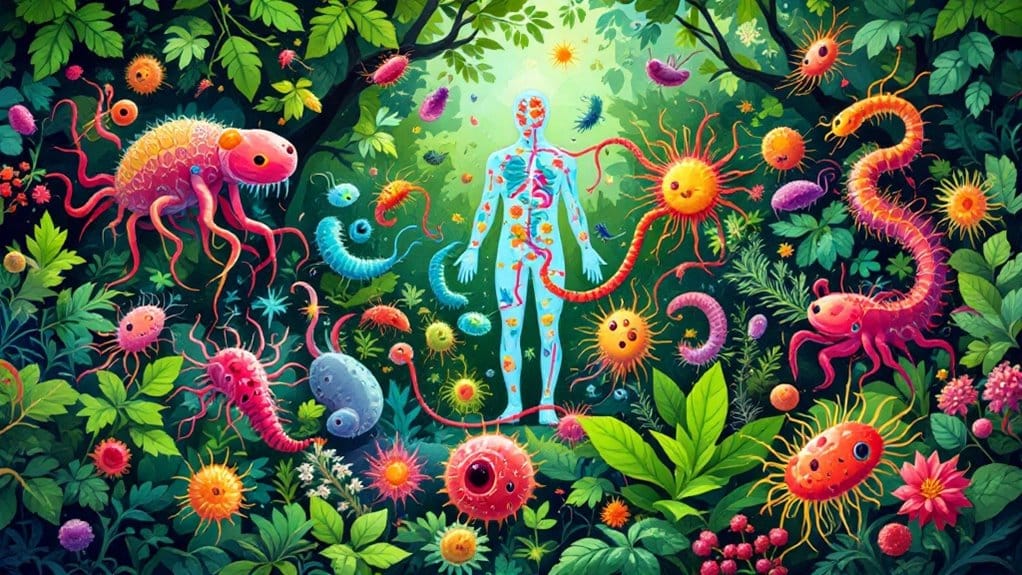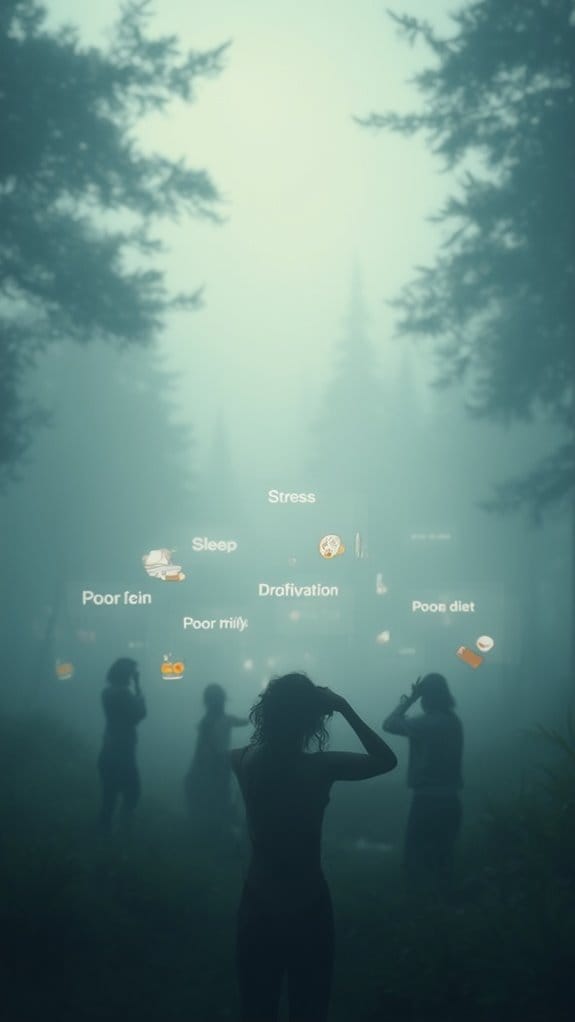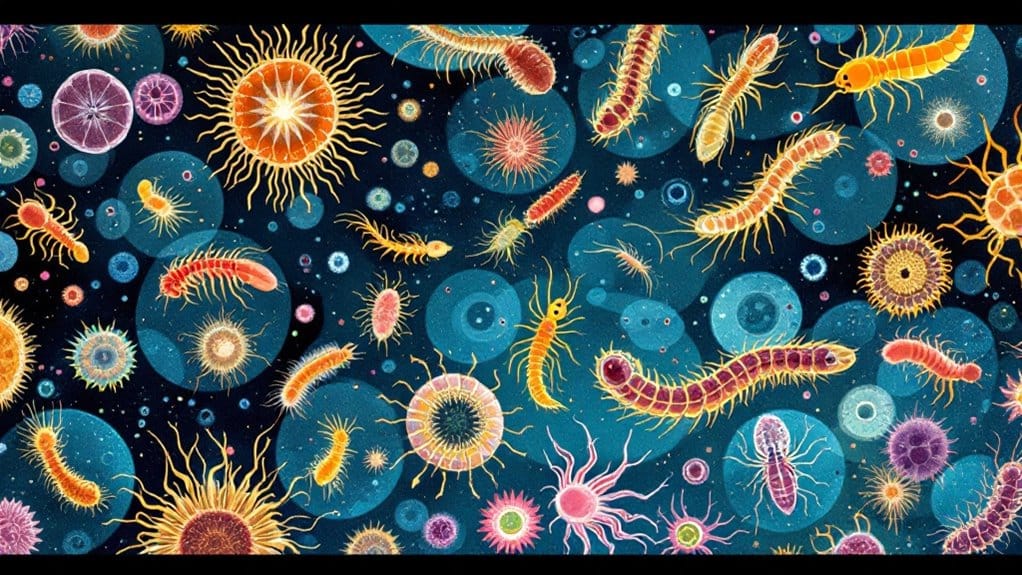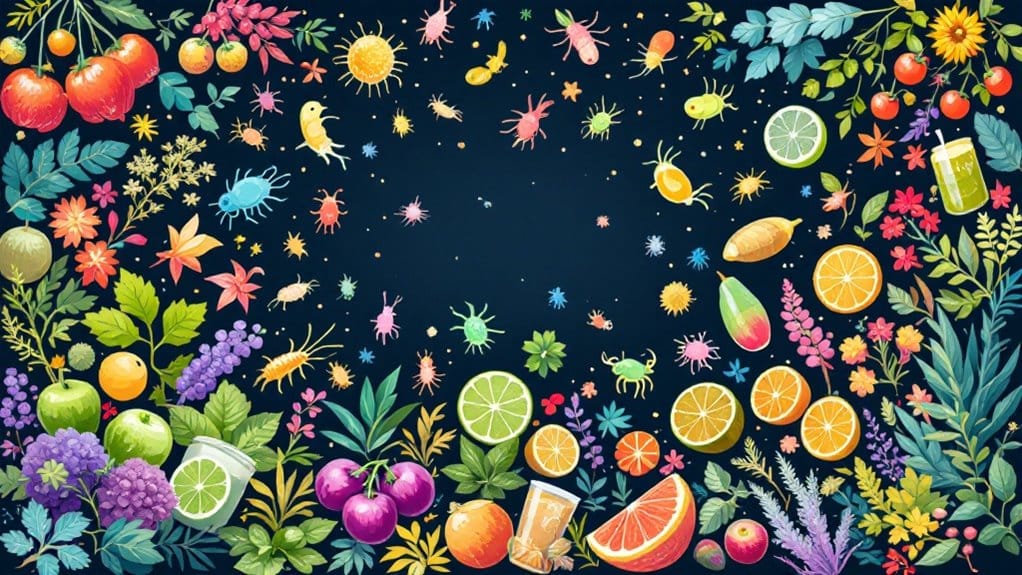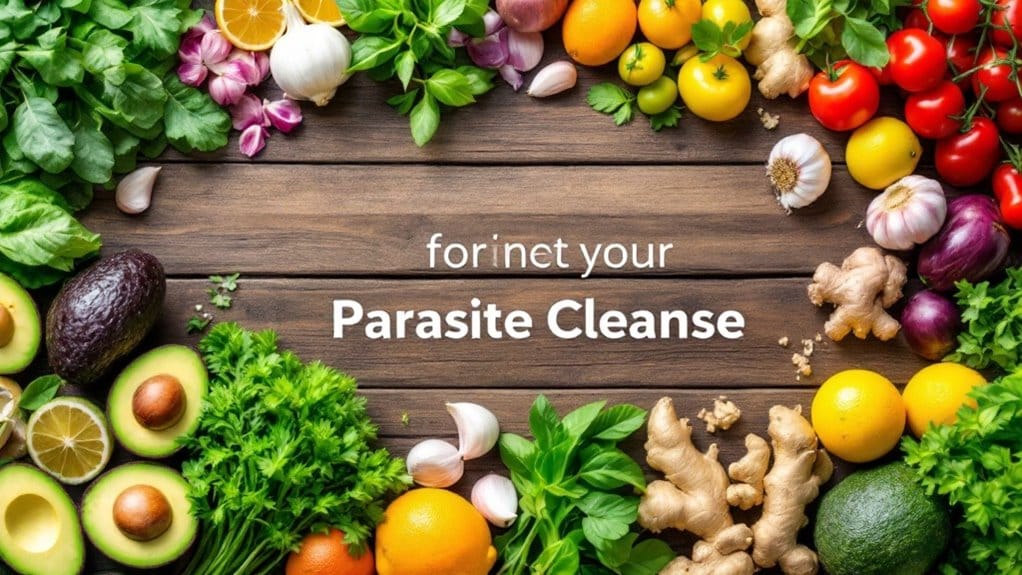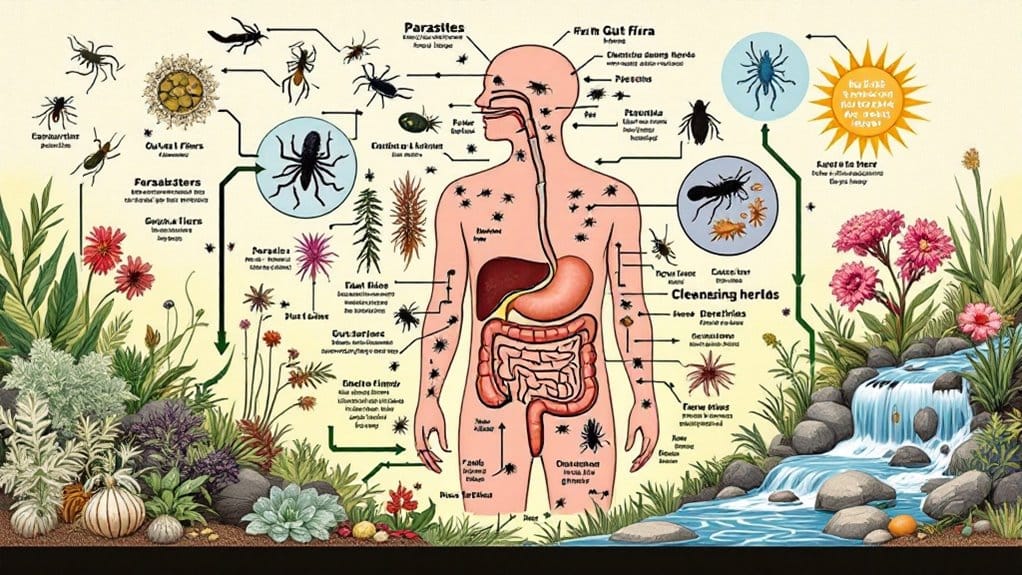Parasite Diet Cleanse: Reset Your Body and Boost Your Health Naturally
Feeling sluggish or bloated? The Parasite Diet Cleanse might be just what you need to reset your body and boost your health naturally. By making targeted dietary changes and incorporating herbal remedies, you can eliminate pesky parasites that disrupt digestion. Imagine how much better you'll feel! It’s all about restoring balance in your gut for improved energy and wellness. Want to explore the best foods to include and tips for success? There’s more to discover!
Key Takeaways
- The Parasite Diet Cleanse utilizes dietary changes and herbal remedies to eliminate parasites and promote digestive health.
- Common symptoms of parasitic infections include digestive issues, fatigue, weight loss, and skin irritations that may go unnoticed.
- Incorporating fiber-rich fruits, vegetables, garlic, and pumpkin seeds while avoiding sugar and processed foods enhances the detox process.
- Benefits of the cleanse include improved digestion, better immune function, clearer skin, and reduced cravings for unhealthy foods.
- Professional consultation is essential before starting the cleanse, especially for individuals with existing health conditions.
Understanding the Parasite Diet Cleanse

When you hear the term “Parasite Diet Cleanse,” you might wonder what it’s all about, right? It’s easy to get lost in the noise of parasite myths floating around. The idea is that certain herbal remedies can help your body eliminate unwanted invaders while promoting overall health.
But don’t be fooled—this isn’t about a magic potion or a quick fix. It’s about understanding what’s really happening in your gut!
The cleanse typically involves dietary changes and natural herbs designed to support your digestive health. Think of it as a reset button for your body, encouraging balance and energy. Many people remain unaware of their parasitic infections until symptoms arise, making it essential to pay attention to your body’s signals.
You might even discover some surprising benefits, like increased energy or improved digestion. Just remember, before diving in, it’s always wise to consult a healthcare professional.
The Science Behind Parasite Cleansing
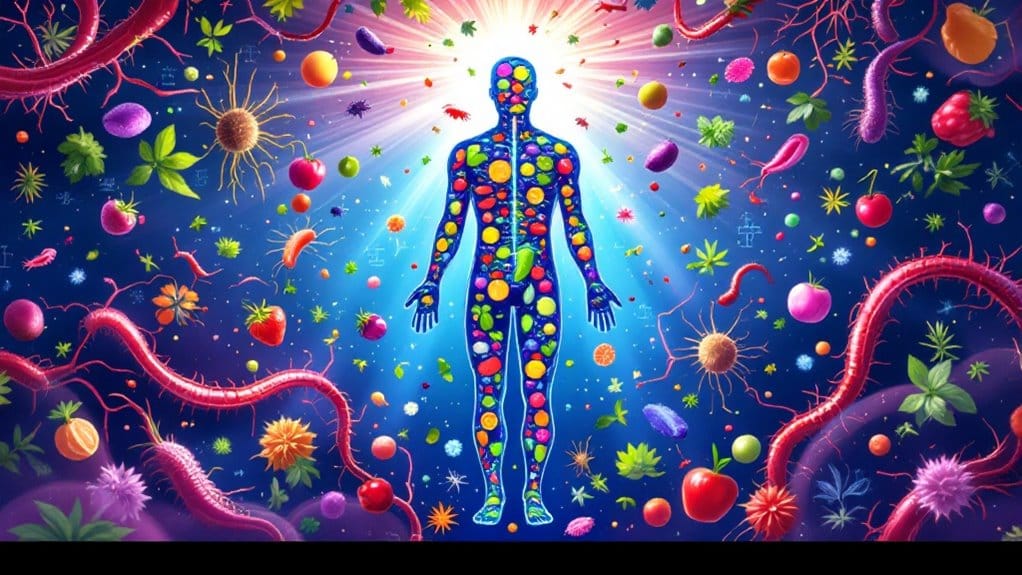
Have you ever wondered how parasites affect your gut health?
Understanding their life cycles can really shed light on why a parasite cleanse might be beneficial for you.
Understanding Parasite Life Cycles
Understanding the life cycles of parasites is essential if you want to tackle them effectively. These sneaky invaders often have complex life cycles that can include multiple hosts and stages.
For instance, a parasite might first exist in an egg form, then hatch and grow in a host, before finally transmitting to another host through various means, like contaminated food or water.
Recognizing how parasite transmission works helps you identify potential risks in your environment. By knowing the life cycle, you can better target your cleansing efforts.
After all, if you understand where these critters thrive, you can take specific actions to disrupt their cycle and reclaim your health. Isn’t it empowering to know you have a strategy?
Impact on Gut Health
Parasites can wreak havoc on your gut health, and if you’re dealing with an infestation, you might be wondering how to fight back effectively.
Cleansing your body can help restore that essential probiotic balance, which is important for maintaining healthy intestinal flora. When parasites invade, they can disrupt this balance, leading to digestive issues and discomfort.
By engaging in a parasite cleanse, you're not just kicking out the unwanted guests; you're also giving your gut a chance to recover and thrive. Imagine your intestinal flora as a bustling community, where harmony is key.
Common Symptoms of Parasite Infestation

When your stomach starts feeling off or you notice unusual changes in your body, it might leave you wondering if something more sinister is at play. Common symptoms of parasite infestation can include digestive issues like bloating, gas, and diarrhea.
You might also experience fatigue, unexplained weight loss, or even skin irritations. These signs can be alarming, but they’re vital for symptom identification.
If you suspect a parasite problem, don’t ignore it! Common treatments include over-the-counter medications and natural remedies that can help cleanse your system.
It’s essential to consult with a healthcare professional for proper diagnosis and guidance. Remember, your body’s signals are important—pay attention to them.
Just think, what if that discomfort is your body’s way of asking for a little help? Taking action now can make a world of difference in how you feel tomorrow.
How the Parasite Diet Works

So, how does the parasite diet actually work?
You'll learn about the foods that can help kick those unwelcome guests to the curb and discover the health benefits that might just surprise you.
Ready to unpack the secrets behind effective parasite cleansing?
Understanding Parasite Cleansing
Imagine your body as a bustling city, where every cell, like a citizen, plays an essential role in keeping things running smoothly.
But what happens when unwanted visitors, like parasites, disrupt the harmony? Understanding parasite cleansing means recognizing how these critters can enter your system through parasite transmission, often through contaminated food or water.
To fight back, you can use natural remedies combined with dietary adjustments that promote microbial balance.
Think of it as a city cleanup: you’re removing the trash that’s causing chaos. By focusing on these methods, you’re not just kicking out the parasites; you’re also creating a healthier environment for your cells to thrive.
Ready to restore order in your body?
Foods to Include
To kick off your parasite diet cleanse, you’ll want to load up on specific foods that support your body’s natural defenses.
Think about incorporating plenty of fresh fruits and vegetables, particularly those rich in fiber. They help flush out toxins!
Also, consider adding herbal remedies like garlic or ginger, which are known for their detoxifying properties.
Don’t forget about whole grains and lean proteins, as they provide essential nutrients while keeping you full.
And, of course, detox drinks are a must! Green smoothies or herbal teas can hydrate and cleanse your body simultaneously.
Expected Health Benefits
While you might be wondering how a parasite diet cleanse can actually benefit your health, the answer lies in its ability to promote a balanced gut environment.
By utilizing holistic approaches, this diet helps eliminate harmful organisms that can disrupt your digestive system. You might feel lighter and more energetic as your body starts to detoxify, flushing out toxins and unwanted guests.
Imagine waking up with improved digestion and a clearer mind! This cleanse also encourages healthy food choices, making it easier for you to adopt better eating habits long-term.
Plus, it can enhance nutrient absorption, allowing your body to thrive. Curious about how it all works? Embrace these detoxification strategies to support your journey toward ideal health!
Foods to Include in the Parasite Diet

When you're diving into the parasite diet, you might wonder what foods can actually help you on your journey to better health. Start by including plenty of fresh fruits and veggies; they’re packed with nutrients and fiber, which support digestion.
Think about incorporating garlic and pumpkin seeds, as both are known for their potential anti-parasitic properties. You might also consider herbal remedies like oregano oil or wormwood, which can be beneficial in this process.
Incorporate garlic, pumpkin seeds, and herbal remedies like oregano oil for their potential anti-parasitic benefits.
Detox smoothies are another great addition. Blend spinach, kale, and a banana for a revitalizing drink that’s not only tasty but also helps cleanse your system.
Don't forget to hydrate too; water is essential for flushing out toxins. Remember, your body needs these wholesome foods to regain balance and energy.
Foods to Avoid During the Cleanse

As you begin your parasite diet cleanse, it’s essential to steer clear of certain foods that can hinder your progress. Avoiding these items is vital for effective parasite prevention strategies and embracing natural detox methods.
Here’s a quick list to guide you:
- Sugar: It feeds parasites and can disrupt your cleanse.
- Processed Foods: These often contain additives and preservatives that can complicate detoxing.
- Dairy Products: They can create mucus, which isn’t helpful during your cleanse.
- Gluten: For some, it may cause inflammation, making it harder to achieve your goals.
Benefits of the Parasite Diet Cleanse

Initiating a parasite diet cleanse can feel like an intimidating task, but the benefits are well worth the effort. One major advantage is the detoxification effects it offers. By eliminating harmful parasites and toxins, you’re not just cleaning your gut; you’re also boosting your overall health.
Imagine feeling lighter, more energetic, and sharper mentally—sounds great, right? A parasite cleanse can help improve digestion, enhance nutrient absorption, and even support your immune system.
With a benefits overview that includes clearer skin and better sleep, it’s clear why many people swear by this approach. You might even find that your cravings for unhealthy foods diminish as your body resets itself.
Potential Risks and Considerations

While the idea of a parasite diet cleanse can sound appealing, it's important to be aware of the potential risks and considerations that come with it.
The allure of a parasite diet cleanse comes with essential risks and considerations to keep in mind.
You might be enthusiastic to try these natural remedies, but here are a few things to keep in mind:
- Nutrient Deficiency: Strict detox methods may limit your nutrient intake, leading to deficiencies.
- Digestive Issues: Some people experience bloating, gas, or constipation during the cleanse, which can be uncomfortable.
- Allergic Reactions: Certain ingredients in cleanses may trigger allergies or adverse reactions, especially if you have food sensitivities.
- Medical Conditions: If you have existing health issues, it’s important to consult a healthcare professional before diving into a parasite cleanse.
How to Prepare for the Cleanse

Before you jump into the cleanse, it’s essential to assess your current diet to see what changes you might need to make.
Have you gathered all the necessary supplies?
Once you’ve got everything lined up, go ahead and set a start date that works for you—this journey is all about preparation and commitment!
Assess Your Current Diet
As you gear up for your parasite diet cleanse, taking a moment to assess your current diet is essential—after all, knowing where you stand can make the journey smoother.
By evaluating your dietary habits, you can enhance your nutrient absorption and set the stage for a successful cleanse. Here’s how to get started:
- Track Your Meals: Write down what you eat for a week to identify patterns.
- Identify Nutrient Gaps: Look for missing nutrients in your meals. Are you getting enough fiber?
- Cut Processed Foods: Note how many processed items you consume—these can hinder your cleanse.
- Hydration Check: Assess your water intake. Are you drinking enough to support your body’s needs?
Reflecting on these aspects can truly set you up for success!
Gather Necessary Supplies
Gathering the necessary supplies for your parasite diet cleanse can feel a bit like preparing for a mini-adventure, and who doesn’t love a good adventure?
To kick things off, create a supply checklist that includes all the essentials you’ll need. You’ll want to stock up on specific foods like fresh fruits, vegetables, and whole grains that support your cleanse.
Don’t forget essential tools like a good blender for smoothies and a journal to track your progress. Having these items on hand will make your journey smoother and more enjoyable.
Plus, it’s always nice to have everything prepared in advance, so you can focus on what really matters—resetting your body and boosting your health naturally.
Ready to plunge into?
Set a Start Date
Choosing a start date for your parasite diet cleanse can feel like picking the perfect moment to leap into a rejuvenating pool—timing is everything!
To make sure you’re ready to immerse yourself, here are some preparation tips to reflect on:
- Choose a time when you’re less busy—avoid stressful periods.
- Plan meals in advance—having a menu can ease your change.
- Inform those around you—let friends and family know about your cleanse for support.
- Set a reminder—mark your calendar to keep your commitment front and center.
Sample Meal Plan for the Parasite Diet

When it comes to the Parasite Diet, having a sample meal plan can make all the difference in your journey toward better health. You might wonder, what should I eat?
Start your day with a smoothie made from spinach, banana, and flaxseed for a nutritious kick. For lunch, try a quinoa salad packed with veggies; it’s invigorating and filling.
Dinner could be grilled chicken with steamed broccoli and a side of sweet potatoes—delicious and wholesome!
Don’t forget meal prep; it’ll save you time and keep you on track. Planning your meals makes sticking to the diet easier.
Also, feel free to make ingredient swaps! If you don't like broccoli, swap it for kale or asparagus. The key is to keep it enjoyable and varied.
Are you ready to plunge into? Embrace this new path, and you'll feel the benefits in no time!
Tips for Success During the Cleanse

To maximize your success during the parasite cleanse, staying focused and positive is key. Embracing this journey can be rewarding, and these tips will help you along the way:
- Stick to Your Schedule: Consistency in your cleansing rituals is essential. Make a daily plan and stick to it.
- Hydrate: Drink plenty of water. Staying hydrated helps flush out toxins and supports your body's natural processes.
- Incorporate Herbal Supplements: Use quality herbal supplements to enhance your cleanse. They can target specific issues and support overall well-being.
- Stay Mindful: Pay attention to how your body feels. Journaling your experiences can help you stay motivated and track progress.
Post-Cleanse Maintenance and Lifestyle

As you wrap up your parasite cleanse, it’s essential to think about how to maintain the benefits you've gained. The journey doesn’t end here!
To keep your body feeling great, focus on developing solid post-cleanse habits. Eating a balanced diet rich in whole foods—think fruits, veggies, and lean proteins—will support your health and help maintain balance.
Focus on solid post-cleanse habits by enjoying a balanced diet of whole foods to support your health and maintain balance.
Hydration is key, too! Drinking plenty of water flushes out toxins and keeps your system running smoothly.
Have you considered adding probiotics to your routine? They can strengthen your gut health and keep things in check.
And don’t forget about stress management! Incorporate activities like yoga or meditation to stay grounded.
Reflecting on your experience and adjusting your lifestyle can create lasting change. Remember, it’s all about making choices that honor your newfound well-being.
Personal Experiences and Testimonials

You've put in the hard work during your parasite cleanse, and now it’s time to celebrate those victories!
Many individuals have shared their personal anecdotes and user reviews, highlighting how this journey transformed their health. Here are some common themes you might resonate with:
- Increased Energy: Many report feeling revitalized and more active.
- Improved Digestion: Users often notice less bloating and discomfort.
- Clearer Skin: A surprising number find their skin clears up markedly.
- Better Sleep: Several testimonials mention deeper, more restful sleep patterns.
These experiences showcase the positive outcomes that can arise from a dedicated cleanse.
Have you noticed any changes yourself? Reflecting on your journey can reinforce your commitment to a healthier lifestyle.
When to Seek Professional Guidance

If you’re feeling off and suspect a parasite might be the culprit, it’s time to tune into your body.
Signs of infection can vary widely, and if you have pre-existing health conditions, getting professional guidance is essential.
After all, no one wants to play doctor when your health's on the line—so why not get a pro’s opinion?
Signs of Infection
Recognizing the signs of a potential infection can feel like maneuvering through a maze, especially when your health is at stake.
It's vital to be proactive about symptom identification for effective infection prevention. If you notice any of the following, it’s time to seek professional guidance:
- Unexplained fever or chills
- Persistent fatigue that doesn’t ease
- Unusual pain or discomfort in your body
- Changes in your digestion or appetite
These symptoms might seem subtle at first, but ignoring them could lead to bigger issues down the road.
Pre-existing Health Conditions
When you’re managing pre-existing health conditions, knowing when to seek professional guidance can feel like trying to find your way in a fog.
It’s essential to have a clear health assessment before starting something like a parasite diet cleanse. If you have conditions such as diabetes, heart issues, or autoimmune disorders, it’s wise to consult your healthcare provider. They can help determine if this cleanse is safe for you.
Remember, your body’s unique, and what works for one person mightn't for you. So, ask yourself: is it worth risking your well-being for a trend?
Prioritize your health—getting professional advice can guarantee you’re on the right path toward feeling your best!
Frequently Asked Questions
Can Children Safely Participate in the Parasite Diet Cleanse?
When it comes to kids and dietary changes, you’ve got to tread carefully.
Children’s health is paramount, and not all diets suit their unique needs. If you're considering a cleanse, think about their dietary restrictions and consult a pediatrician first.
After all, you wouldn’t want to disrupt their growth or energy levels, right?
It’s all about balance and making sure they’re getting the nutrients they need to thrive.
How Long Should I Stay on the Cleanse?
Imagine your body as a garden; sometimes, it needs a little weeding to thrive.
For a cleanse duration, aim for two to four weeks. This gives your body enough time to reset and rejuvenate. You’ll feel lighter and more energized, but listen to your body too.
If something feels off, don’t hesitate to pause or consult a pro.
Is It Safe to Exercise During the Cleanse?
Is it safe to exercise during a cleanse? Well, it depends!
You can still work out, but you might want to dial down the exercise intensity. Instead of hitting the gym hard, consider workout modifications like gentle yoga or light cardio.
Listen to your body; if you feel fatigued, it’s okay to take a break. After all, your health comes first.
Will I Experience Weight Loss on This Diet?
When you start a new diet, you might wonder about weight loss and its effectiveness.
While individual results vary, many find that following a structured plan can lead to some pounds melting away.
Just remember, it’s not all about the scale; you're also aiming for improved health.
So, are you ready to embrace this journey?
With the right mindset and commitment, you might just surprise yourself with how effective it can be!
Can I Combine This Diet With Other Detox Programs?
Did you know that nearly 75% of people try multiple detox programs at once?
You can combine this diet with other detox programs, but pay attention to program compatibility.
It's vital to guarantee detox synergy, as some elements might clash or overwhelm your system.
Think about how the different diets will work together; are they complementary?
Keep an eye on how you're feeling, and adjust if necessary.
Your body will appreciate the care!
Conclusion
As you wrap up your parasite diet cleanse, think of your body as a garden. Just like a garden needs weeding to thrive, your body benefits from a reset to flourish. By embracing this journey, you’re not just clearing out unwanted guests; you’re nurturing your health for the long haul. So, why not keep those healthy habits alive? After all, a vibrant garden needs care, and your well-being deserves the same attention. Ready to bloom?

























